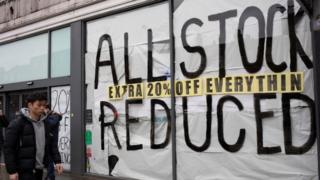
Image copyright
Mike Kemp
Nearly a fifth of all small and medium-sized businesses in the UK are unlikely to get the cash they need to survive the next four weeks, in spite of unprecedented government support.
That’s according to research published today, which suggests that between 800,000 and a million businesses nationwide may soon have to close.
Many firms have told the BBC that banks have refused them emergency loans.
Others can’t get through on the phone or were told the money will take weeks.
The banks say they are following the rules set out by the government.
Chancellor Rishi Sunak said two weeks ago businesses would be able to walk into bank branches and discuss Coronavirus Business Interruption loans of up to £5m to help them survive the shutdown.
The promise from the chancellor was that “any good business in financial difficulty who needs access to cash to pay their rent, the salaries of their employees, pay suppliers, or purchase stock, will be able to access a government-backed loan, on attractive terms”.
But with most bank branches closed, thousands of struggling firms can’t get through by phone or, when they do, are being told by banks they’re not eligible.
Steve Lord runs Belgrave & Powell, a Nottingham-based engineering group employing 120 people and supplying services to customers such as BAE’s Samlesbury site, where the F-35 and Typhoon fighter jets are made.
‘Disappointment after disappointment’
Since Salmesbury halted production, his business – like millions of others – is facing the prospect of cash drying up, threatening its ability to pay wages and stay afloat.
“I was heartened and astonished to see the unprecedented help that was announced by the government two weeks ago,” he said. “But we put one of our most senior people on it and as each day passed it was disappointment after disappointment.”
He said some of the approved lenders were demanding interest rates of up to 30%, which Mr Lord believes is “taking advantage of the situation”. Meanwhile, he said, High Street banks were charging around 7%, however he was told it could be as long as a month before his firm got the money.
Mr Lord thinks too much control has been handed to the banks and approved lenders: “The government needs to make it so everyone’s offering the same terms.”
“It seems to be that if you are lucky you are banking with the right party, if you’re not lucky you’ll end up having to close your business.”
‘The loans won’t help’
Another business owner, Peter Jackson – who runs jewellery shops employing 40 people across the north-west of England – said his bank decided he was ineligible because the firm made a small loss in 2019. But Mr Jackson said his business was viable before the shutdown and expected to make a profit this year. It also owns valuable stock.
“I thought the whole point of the loans was to help business like mine stay afloat,” he said. “But they’re not going to help.”
The figures identifying how many businesses would not be able to access cash come from a network of accountants serving more than 12,000 small and medium-sized businesses across the country.
After analysing the government help on offer, those accountants say that 18% of their clients were unlikely to get access to the cash they will need to survive a four-week lockdown.
Image copyright
Getty Images
The findings echo similar reports from other business groups, estimating that up to a fifth of businesses could close if the lockdown lasts a month or more.
Bank say they’re following rules set by the government, which mean firms can only get the emergency loans if they can’t borrow in a normal commercial way, like borrowing against the value of a property.
Businesses wanting to borrow more than £250,000 are being told by banks that directors must sign personal guarantees. That means if the loan goes bad owing to a prolonged shutdown, their personal property is on the line.
Joshua Wade runs a fast-growing ethical cosmetics business, Skin and Tonic. He said lenders were insisting on early repayment penalties as well as personal guarantees.
Image copyright
Skin and Tonic
Joshua Wade founded Skin and Tonic with his partner Sarah
“The Business Interruption Loan Scheme is, in principle, very welcome support right now,” he said.
“But the huge barrier for us is the requirement for all directors to give personal guarantees. As founders and executive directors, we already are risking everything but we simply can’t ask our non-executive directors to take that risk on in such challenging and uncertain times.”
A spokesperson for UK Finance, the bank trade body, said: “Lenders are working hard to get financing to all businesses who need it as quickly as possible and are using the Coronavirus Business Interruption Loan Scheme (CBILS) where appropriate, with some funding having already been provided under the scheme.
“All lenders will take into account a business’s individual circumstances when considering applications and many business loans can be provided either unsecured or secured on business assets.”
Kirsty McGregor, founder of the Corporate Finance Network, told the BBC: “Small and medium-sized businesses employing less than 250 people employ most of the workforce – 23 million people.
“We could lose up to a million of them in the next month or so. And it will be irreversible which will be catastrophic for the UK economy.”
Ms McGregor suggested the government needs to encourage small businesses to take over companies going bust in their area so employees can still be paid.
Source link
